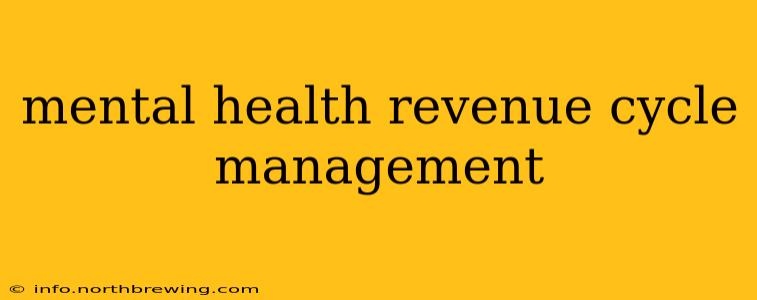The mental healthcare industry faces unique challenges in revenue cycle management (RCM). From complex insurance reimbursements to the sensitive nature of patient interactions, optimizing the financial side of operations requires a specialized approach. This comprehensive guide delves into the intricacies of mental health RCM, offering strategies to improve efficiency, increase revenue, and ultimately, enhance patient care.
What is Mental Health Revenue Cycle Management?
Mental health revenue cycle management encompasses all administrative and clinical processes involved in capturing, processing, and collecting payments for services rendered. It's a crucial component of any successful mental health practice, ensuring financial stability and the ability to continue providing vital care. This includes everything from scheduling appointments and verifying insurance coverage to billing, coding, and managing accounts receivable. Unlike general medical practices, mental health RCM often needs to navigate specific insurance complexities and address the unique needs of a vulnerable patient population.
What are the Key Challenges in Mental Health Revenue Cycle Management?
The mental health field presents unique hurdles in managing revenue effectively. Let's explore some key challenges:
Complex Insurance Reimbursements and Authorizations:
Mental health insurance plans often have intricate requirements for pre-authorization, specific coding guidelines, and varying reimbursement rates. Navigating this complex landscape is crucial for maximizing revenue. Failure to obtain proper authorizations or correctly code services can result in significant financial losses.
High Rates of Uninsured or Underinsured Patients:
Many individuals seeking mental health services lack adequate insurance coverage or are underinsured, leading to challenges in collecting payments. Developing effective strategies for handling uninsured patients, such as establishing payment plans or offering sliding-scale fees, is essential for maintaining financial viability.
Patient Privacy and Confidentiality:
Maintaining patient confidentiality is paramount in mental healthcare. RCM processes must comply with HIPAA regulations and other privacy laws to ensure the protection of sensitive patient information. This often involves additional layers of security and careful handling of data.
Staffing and Training:
Efficient RCM requires skilled staff with expertise in mental health billing, coding, and insurance regulations. Investing in adequate training and retaining qualified personnel is crucial for optimal performance.
How Can Mental Health Practices Improve Their Revenue Cycle Management?
Several strategies can significantly improve mental health RCM:
Implementing a Robust Electronic Health Record (EHR) System:
A comprehensive EHR system is essential for streamlining administrative tasks, automating billing processes, and improving data management. Look for systems designed specifically for mental health practices, which often have built-in tools for managing authorizations, coding, and reporting.
Leveraging Technology for Automation:
Automation tools can significantly reduce manual workloads and minimize errors. This includes automating appointment scheduling, insurance verification, claims submission, and payment posting.
Employing Skilled and Trained Staff:
Invest in hiring and training dedicated staff with expertise in mental health billing and coding, insurance regulations, and patient communication. Regular training updates are crucial to keep staff informed about changing guidelines and regulations.
Developing Strong Patient Communication Strategies:
Open and transparent communication with patients regarding billing and insurance is key to improving payment collections. Clearly explaining fees upfront and offering flexible payment options can help reduce outstanding balances.
Regularly Reviewing and Analyzing Key Performance Indicators (KPIs):
Tracking and analyzing KPIs such as claim acceptance rates, days in accounts receivable, and patient payment rates allows for identifying areas for improvement and measuring the effectiveness of implemented changes.
What are the Best Practices for Mental Health Revenue Cycle Management?
Regularly Updating Billing and Coding Practices:
Stay informed about changes in insurance regulations, coding guidelines (e.g., CPT and ICD codes), and reimbursement policies. This ensures compliance and accurate claims submission.
Optimizing the Claims Submission Process:
Focus on submitting clean claims – complete, accurate, and error-free – to minimize denials and reduce the time required for payment. This often involves proactive verification of patient insurance information and ensuring accurate coding.
Frequently Asked Questions (FAQ)
How can I improve patient collections in mental health RCM?
Improving patient collections requires clear communication, multiple payment options (credit cards, online portals, payment plans), and proactive follow-up on outstanding balances. Consider offering financial assistance programs for patients facing hardship.
What are the specific coding requirements for mental health services?
Mental health services require specific CPT and ICD codes. Staying up-to-date on the latest coding guidelines is crucial for accurate billing and reimbursement. Professional coding services are often a helpful investment.
What role does technology play in streamlining mental health RCM?
Technology is a key component of efficient mental health RCM. EHR systems, automated billing software, and online payment portals automate tasks, reduce errors, and improve efficiency.
How can I ensure HIPAA compliance in my mental health practice's RCM?
HIPAA compliance requires robust security measures to protect sensitive patient data. This involves implementing appropriate security protocols, staff training on privacy regulations, and regular audits to ensure compliance.
By focusing on these strategies and addressing the unique challenges within mental health RCM, practices can optimize their financial operations, ensuring the long-term sustainability and success of providing essential care. Remember that a strong RCM system is not just about maximizing revenue; it's about enabling practices to dedicate more time and resources to delivering high-quality, compassionate patient care.
